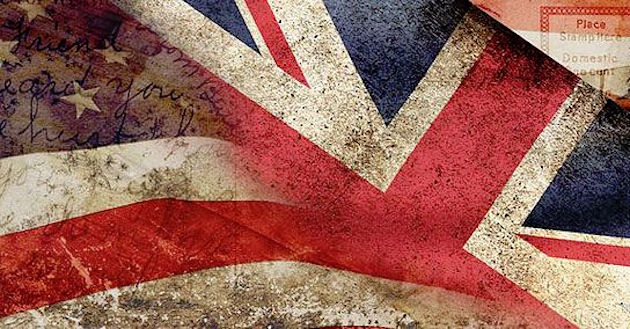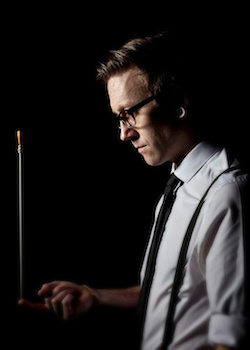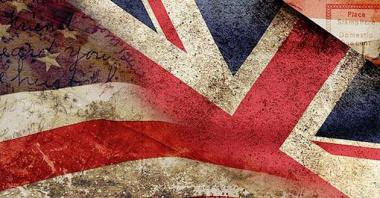
Completely in line with its mission to bring “intriguing and unique works of music from around the world,” concert series Curious Flights presented a wide variety of freshly minted compositions, including three interesting world premieres and two exciting U.S. premieres, during “Transatlantic Crossings,” last Saturday evening, March 19, at the San Francisco Conservatory.

One of the “transatlantic crossings” concerned Simon Dobson, a two-time British Composer Award winner. Dobson did a week-long residency visiting high schools and music institutions around San Francisco in addition to preparing for Saturday’s concert, which included three of his pieces. One of them, A Modulation on Plymouth Sound, was commissioned by Curious Flights and written specifically for its founder and artistic director, clarinetist Brenden Guy, who also performed the world premiere.
A Modulation on Plymouth Sound is a piece for clarinet and electronics, which includes an ongoing backingtrack with sound recorded at the bay off the city of Plymouth in the Southwest U.K., plus a digital reverb controlled via a pedal by the clarinetist. The piece included an unscripted and brief struggle with an extension cord that wasn’t quite long enough, but the music itself opened up with the soloist introspectively musing until the clarinet part got more and more dense, rhythmic and extroverted, playing with and responding to the gentle backdrop of the electronics. This was Dobson’s first foray into writing for clarinet solo, but as a wind player himself (trumpet), he understands the possibilities and limitations of the instrument.
The two other world premieres on the program required the involvement of the San Francisco Wind Ensemble (SFWE), this time without its own music director Martin Seggelke, but conducted by the composers of the new pieces: The Wireless by Noah Luna, and Metanoia by Bobby Chastain, who are both Bay Area-based.
In his program notes for The Wireless, Luna describes the days before television, when the centerpiece of every living room was a large wireless radio which could only be operated by scrubbing through the static until a clear signal emerged. The resulting composition includes fragments of swing, jazz, and vaguely Copland-ish harmonies and melodies, in which a better conductor than the composer himself can probably find more depth than I heard on Saturday evening. Most interesting and original were the intermittent pieces of composed "static" full of dissonance, tone clusters and angular rhythms.
Bobby Chastain’s Metanoia is a more radical piece, a sound poem with lots of atmosphere and well rendered effects such as a rich texture of interweaving rhythmic fragments by different sections and groups of instruments, or the total disintegration of a densely written climax — one of many in the piece — into a bleak moonscape of sound. Chastain composed Metanoia in 2009, but this was the world premiere of the re-orchestration for symphonic wind orchestra, commissioned by Curious Flights. The piece could have lasting appeal for wind ensembles around the world.
Dobson’s Another World’s Hell has already reached that status. The piece is inspired by Aldous Huxley’s detailed description of music in his 1932 novel Brave New World and was composed for a major brass and wind festival in Switzerland in 2013.
With Dobson conducting and the SFWE in top form, Saturday’s U.S. premiere shows Dobson’s knack for colorful and refined instrumentation, rhythmic and harmonic inventiveness, and his ability to create a transparent orchestral sound throughout — both when using intimate musical gestures and when pulling out all the stops. Which is also what he did in Crystal, a radiant fanfare for eight trumpets that opened the concert with brilliant, ear-piercing cascades of sound.
Also part of this edition of “Transatlantic Crossings” — the initiative was launched during Curious Flights’ opening season in 2013 — were existing works by two other Bay Area composers.
Tension Study No. 1 by Samuel Adams, written for and played by Travis Andrews (electric guitar) and Andy Meyerson (vibraphone/percussion), is an eerie piece in which the juxtaposition of the languid guitar against the snappy percussion somehow conjures up images of a movie that is set in a smoky bar in the Deep South.
Mason Bates’ Red River for chamber ensemble and electronics, was played by Tess Varley (violin), James Jaffe (cello), Brenden Guy (clarinet), and Ian Scarfe (piano and electronics). The piece’s rich melodic and rhythmic energy culminated in a hypnotic moment of sacred silence before well-deserved applause broke loose.

